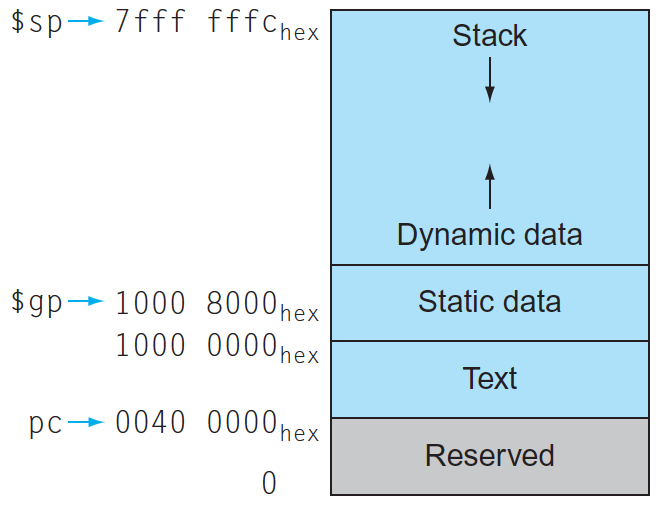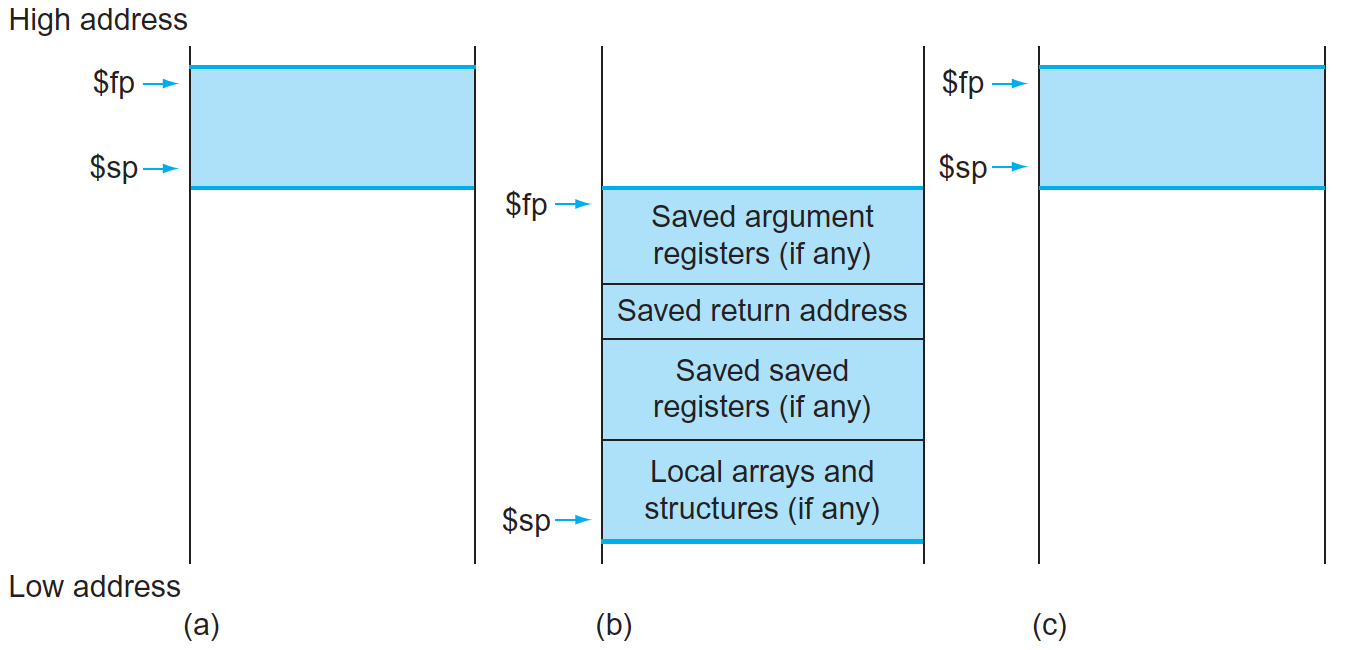# Dynamic Memory Allocation --- CS 130 // 2024-11-21 <!--=====================================================================--> # Review <!-- .slide: data-background="#004477" --> <!--=====================================================================--> ## Exercise from last time - write a function that computes the average of a bunch of `double` values - get data for 10 doubles from user and call the average function - make it work for any number of inputs <!----------------------------------> ## Double function ```c #include "stdio.h" double average(double arr[], int n) { double total = 0.0; double average; for(int i = 0; i < n; i++) { total += arr[i]; } average = total/n; return average; } int main() { double my_array[5] = {1.1,2.2,3.3,4.4,5.5}; double result; result = average(my_array,5); printf("The average is %f\n",result); return 0; } ``` <!----------------------------------> ## Getting 10 values from the user ```c int main() { int array_length = 10; double my_array[array_length]; double result; for(int i = 0; i < array_length; i++) { printf("Enter a double: "); scanf("%lf",&my_array[i]); // %lf is "long float" for a double } result = average(my_array,array_length); printf("The average is %lf\n",result); return 0; } ``` - What do we need to change to make it work for any number? <!--=====================================================================--> # Working with unknown array sizes <!-- .slide: data-background="#004477" --> <!--=====================================================================--> ## Discussion What do you have to change so that it works like this? ```console Enter a double: 1.5 Do you want to enter another value (y/n)? y Enter a double: 2.0 Do you want to enter another value (y/n)? y Enter a double: 7.1 Do you want to enter another value (y/n)? y Enter a double: 2.1 Do you want to enter another value (y/n)? y Enter a double: 42.3 Do you want to enter another value (y/n)? y Enter a double: 0.1 Do you want to enter another value (y/n)? y Enter a double: -4.1 Do you want to enter another value (y/n)? y Enter a double: 0.9 Do you want to enter another value (y/n)? n The average is 5.190000 ``` <!--=====================================================================--> # C and The Computer's Memory <!-- .slide: data-background="#004477" --> <!--=====================================================================--> ## A Problem - Suppose I want to create a function called `duplicate` that takes an array of integers as input, creates an identical copy of it, and returns it - What are some issues we have to think about when implementing this? <!----------------------------------> ## A First Attempt ```c int * duplicate(int *arr, int n) { int new_arr[n]; for (int i = 0; i < n; i++) { new_arr[i] = arr[i]; } return new_arr; } ``` - <!-- .element: class="fragment"--> This is incorrect! - <!-- .element: class="fragment"--> The array `new_arr` is **locally scoped** and its memory is freed once the function returns! <!----------------------------------> ## Try it yourself and see what happens ```c #include <stdio.h> int * duplicate(int *arr, int n) { int new_arr[n]; for (int i = 0; i < n; i++) { new_arr[i] = arr[i]; } return new_arr; } int main() { int myarr[5] = {1,2,3,4,5}; int *myarr_copy = duplicate(myarr,5); for(int i=0; i< 5; i++) { printf("%d\n",myarr_copy[i]); } return 0; } ``` <!--=====================================================================--> # Stack / Heap Memory <!-- .slide: data-background="#004477" --> <!--=====================================================================--> ## Review: Memory Structure  <!--====================================================================--> ## Review: Stack Frames  <!--====================================================================--> ## Stack Memory - **Stack memory** is the space where local variables, function calls, etc., are allocated - <!-- .element: class="fragment"--> Locally scoped variables are freed when the code block they were defined in finishes <!----------------------------------> ## A First Attempt ```c int * duplicate(int *arr, int n) { int new_arr[n]; //memory created like this is put on the stack! for (int i = 0; i < n; i++) { new_arr[i] = arr[i]; } return new_arr; } ``` <!--=====================================================================--> ## Heap Memory - **Heap memory** persists between function calls + <!-- .element: class="fragment"--> In C, we must manually create and destroy heap memory <!----------------------------------> ## Heap Memory - `malloc(n)` creates `n` bytes of heap memory ```c // Creates an array on the heap with enough // space to hold 10 ints int *arr = malloc(10*sizeof(int)); ``` - <!-- .element: class="fragment"--> `sizeof(int)` is the number of bytes of one `int` - <!-- .element: class="fragment"--> `free(...)` is destroys heap memory ```c free(arr); // releases the memory ``` - <!-- .element: class="fragment"--> Must call `free` on the pointer returned by `malloc` - <!-- .element: class="fragment"--> These functions are in the `stdlib.h` library <!----------------------------------> ## A Second Attempt ```c int * duplicate(int *arr, int n) { int *new_arr = malloc(n * sizeof(int)); for (int i = 0; i < n; i++) { new_arr[i] = arr[i]; } return new_arr; } ``` <!----------------------------------> ## Visualize it and then run it yourself [C Tutor Visualization](https://pythontutor.com/visualize.html#code=int%20*duplicate%28int%20*arr,%20int%20n%29%20%0A%7B%0A%20%20%20%20int%20*new_arr%20%3D%20malloc%28n%20*%20sizeof%28int%29%29%3B%0A%20%20%20%20for%20%28int%20i%20%3D%200%3B%20i%20%3C%20n%3B%20i%2B%2B%29%20%0A%20%20%20%20%7B%0A%20%20%20%20%20%20%20%20new_arr%5Bi%5D%20%3D%20arr%5Bi%5D%3B%0A%20%20%20%20%7D%0A%0A%20%20%20%20return%20new_arr%3B%0A%7D%0A%0Aint%20main%28%29%20%7B%0A%20%20int%20arr%5B5%5D%20%3D%20%7B100,%20200,%20300,%20400,%20500%7D%3B%0A%20%20%0A%20%20int%20*dup%20%3D%20duplicate%28arr,%205%29%3B%0A%20%20dup%20%3D%20duplicate%28arr,%205%29%3B%0A%20%20%0A%20%20return%200%3B%0A%7D&cumulative=false&heapPrimitives=nevernest&mode=edit&origin=opt-frontend.js&py=c_gcc9.3.0&rawInputLstJSON=%5B%5D&textReferences=false) ```c #include <stdio.h> #include <stdlib.h> int * duplicate(int *arr, int n) { int *new_arr = malloc(n * sizeof(int)); for (int i = 0; i < n; i++) { new_arr[i] = arr[i]; } return new_arr; } int main() { int myarr[5] = {1,2,3,4,5}; int *myarr_copy = duplicate(myarr,5); for(int i=0; i< 5; i++) { printf("%d\n",myarr_copy[i]); } free(myarr_copy); return 0; } ``` <!--=====================================================================--> ## Example - Let's write a function that does this: + Takes two strings as input + Concatenates them together into a new string + Returns the string - We'll make use of the `strlen` function in `<string.h>`: https://cplusplus.com/reference/cstring/strlen/ <!----------------------------------> ## Example Solution ```c char *str_concat(char *s1, char *s2) { int len1 = strlen(s1); //finds the length not counting null terminator int len2 = strlen(s2); int len3 = len1 + len2 + 1; char *s3 = malloc(len3*sizeof(char)); int pos = 0; for (int i = 0; i < len1; i++, pos++) { s3[pos] = s1[i]; } for (int i = 0; i < len2; i++, pos++) { s3[pos] = s2[i]; } s3[pos] = '\0'; return s3; } ``` [C Tutor Visualization](http://www.pythontutor.com/c.html#code=%23include%20%3Cstdio.h%3E%0A%23include%20%3Cstdlib.h%3E%0A%23include%20%3Cstring.h%3E%0A%0Achar*%20str_concat%28char%20*s1,%20char%20*s2%29%0A%7B%0A%20%20%20%20int%20len1%20%3D%20strlen%28s1%29%3B%0A%20%20%20%20int%20len2%20%3D%20strlen%28s2%29%3B%0A%20%20%20%20int%20len3%20%3D%20len1%20%2B%20len2%20%2B%201%3B%0A%20%20%20%20char%20*s3%20%3D%20%28char*%29%20malloc%28len3*sizeof%28char%29%29%3B%0A%0A%20%20%20%20int%20pos%20%3D%200%3B%0A%20%20%20%20for%20%28int%20i%20%3D%200%3B%20i%20%3C%20len1%3B%20i%2B%2B,%20pos%2B%2B%29%0A%20%20%20%20%7B%0A%20%20%20%20%20%20%20%20s3%5Bpos%5D%20%3D%20s1%5Bi%5D%3B%0A%20%20%20%20%7D%0A%20%20%20%20for%20%28int%20i%20%3D%200%3B%20i%20%3C%20len2%3B%20i%2B%2B,%20pos%2B%2B%29%0A%20%20%20%20%7B%0A%20%20%20%20%20%20%20%20s3%5Bpos%5D%20%3D%20s2%5Bi%5D%3B%0A%20%20%20%20%7D%0A%20%20%20%20s3%5Bpos%5D%20%3D%20'%5C0'%3B%0A%20%20%20%20%0A%20%20%20%20return%20s3%3B%0A%7D%0A%0Aint%20main%28%29%0A%7B%0A%20%20%20%20char%20*arr1%20%3D%20%22abc%22%3B%0A%20%20%20%20char%20arr2%5B7%5D%20%3D%20%22defghi%22%3B%0A%20%20%20%20char%20*arr3%20%3D%20str_concat%28arr1,%20arr2%29%3B%0A%0A%20%20%20%20printf%28%22arr1%20is%3A%20%25s%5Cn%22,%20arr1%29%3B%0A%20%20%20%20printf%28%22arr2%20is%3A%20%25s%5Cn%22,%20arr2%29%3B%0A%20%20%20%20printf%28%22arr3%20is%3A%20%25s%5Cn%22,%20arr3%29%3B%0A%0A%20%20%20%20free%28arr3%29%3B%0A%7D&curInstr=0&mode=display&origin=opt-frontend.js&py=c&rawInputLstJSON=%5B%5D) <!--=====================================================================--> ## Assignment 9 - [Assignment 9](../../assignments/assignment-9/) - One convenient method in Python is the `str.join()` method. For example: ```py >>> " ".join(["The", "quick", "brown", "fox"]) "The quick brown fox" ``` - <!-- .element: class="fragment"--> What would the function prototype have to be? ```c // Takes an array of n strings and returns // a new string allocated on the heap char *join(char **arr, int n) ``` <!-- .element: class="fragment"--> - <!-- .element: class="fragment"--> Finish implementing this